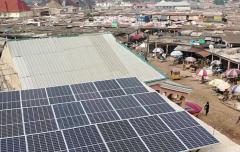Partner Spotlight: UN Economic Commission for Europe (UNECE)
The United Nations Economic Commission for Europe (UNECE) is playing a significant role in moving the dial on energy for sustainable development as highlighted in this Partner Spotlight interview with Olga Algaverova, Under-Secretary-General of the U.N. and Executive Secretary of UNECE.
What is the mission of UNECE?
UNECE is one of the UN’s five regional commissions. Our region includes 56 member states in Europe, North America and Asia. Our main mission is to support our member states in the implementation of the 2030 Agenda and the Sustainable Development Goals (SDGs). We are active in many sectors including transport, environment, housing and land use, forestry, sustainable energy, statistics, trade, and aging. Our work in these sectors falls into three broad areas: improving connectivity across economies and sectors; reducing environmental pressures and using resources sustainably; and creating dynamic, resilient economies. Given our multi-sectoral, transboundary approach, we can provide countries with effective, integrated solutions for sustainable development.
How does UNECE support Sustainable Development Goal 7 (SDG7)?
UNECE’s work on sustainable energy is designed to improve access to affordable and clean energy for all and reduce greenhouse gas emissions and the carbon footprint of the energy sector. Our focus is on “energy for sustainable development,” a vision that encompasses SDG 7 within the broader 2030 Agenda to embrace climate change, sustainable urban development, mobility and quality of life. From an energy perspective, delivering on all the goals is increasingly challenging as the world becomes more populous and prosperous. Ensuring reliable and affordable access to energy for all requires a comprehensive and sustainable approach.
What do you see as the priority areas of SDG7 to help meet the 2030 targets?
SDG7 requires careful attention because the objectives of the 2030 Agenda will not be met if the world does not address the environmental footprint of using fossil energy. Longer-term, there is a fundamental need to reinvent energy as a service industry in order to improve energy productivity and to unleash new business models and transformative investments. UNECE’s sustainable energy activities fall into three broad categories: 1) sustainable resource management; 2) deep transformation of the energy system; and 3) reducing the environmental footprint of the energy sector.
Tell us more about your initiative ‘Pathways to Sustainable Energy’.
Our Pathways project is exploring how our region can attain energy for sustainable development. Its relevance and urgency have been reinforced by recent reports on climate change and on the UN’s assessments of how well we are achieving the targets, which has not been satisfactory. The key challenge we see is how countries can progress across all their priorities: ensuring energy security, protecting the environment, and providing quality of life for all. Our region is highly diverse, with countries in different development stages, countries that either export or import fossil fuels, and countries that prioritize renewable energy, nuclear power, or carbon capture and storage. Each technology has a role to play if the world is to achieve sustainable energy, but solutions, players, and business models will differ substantially. The initiative brings together all stakeholders, and we are proud to work with three leading international research organisations: the Fraunhofer Institute, the International Institute for Applied Systems Analysis (IIASA), and the Pacific Northwest National Laboratory (PNNL), to assess technology options and develop solutions for a carbon-constrained world. The results will inform countries of their choices and the trade-offs they face when embarking on their respective energy transitions.
What role does UNECE play in meeting the SDGs?
UNECE supports countries in achieving the 2030 Development Agenda by helping them identify solutions to common problems. For seven decades, UNECE has been providing policy advice to our member states, but we also have been a platform to develop norms, standards, and guidelines in various fields pertaining to sustainable development, such as environment, transport, energy, housing and other areas. These norms help countries translate global commitments such as the SDGs into practical action. The results of our work are available not only to our region but to all U.N. member states.
All these outcomes are possible through our role as a platform for governments to cooperate and engage with all stakeholders. Our unique convening power brings together experts from across the region to share expertise, learn from one another, and advance our ambitions. This is one of the key features of the Regional Forum on Sustainable Development that we convene every year and that feeds into national and global sustainable development processes. An area of particular importance for me is that we promote women’s economic empowerment and we highlight gender equality in all our activities.
The U.N. Climate Summit in September 2019 will mobilize action and enhance ambition by focusing on six specific areas: energy transition; industry transition; resilience; local action and cities; finance and carbon pricing; and nature-based solutions. Our communities of experts are making significant contributions in each of these areas.
What does your partnership with SEforALL focus on?
We are very pleased with our partnership with SEforALL. The terms are set forth in the memorandum of understanding that we signed in 2017. The overarching goal of the collaboration is to support and accelerate global attainment of energy for sustainable development. The possible areas of cooperation include the International Fora on Energy for Sustainable Development and the SEforALL Forum, tracking progress to SDG7, and specific activities related to energy access, energy efficiency, and renewable energy. We look forward to collaborating with SEforALL to ensure adequate resourcing of the various activities.
Image: Biogas used in household - Kyrgyzstan



